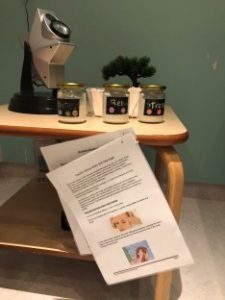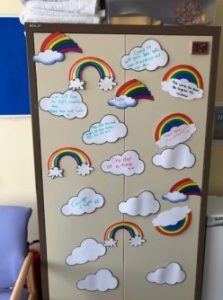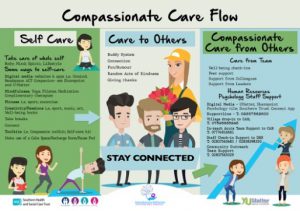17th June 2020
In collaboration with Human Resources, the Psychology Department prioritised the needs of staff particularly in helping support them through the Covid surge planning stage. As patient facing service delivery was temporarily stepped down in March it enabled the Department to deploy its staff into the new Human Resources Psychology Staff Support Service.
The aim of the service is to enhance staff wellbeing, promote resilience and support staff experiencing stress and distress related to Covid. As a responsive needs-led service, the team is continually adapting and evolving based on the needs identified through the relationships they have formed with other teams. At the heart of the service is a compassion-informed approach.
Four areas of support have been developed to date based on a continuum of support and Psychological First Aid, with a compassion-informed approach at the heart of everything they do:
1. Communication

Resources and techniques were collated and designed in response to the identified needs.
- Resources and links for staff, leaders, parents and children including bespoke breathing practices for promoting relaxation when using PPE are available on the Psychology SharePoint tile and SHSCT YouTube.
- Bespoke resources for leaders and staff were developed and displayed within hospital and community sites i.e. Well-being check-ins to support compassionate care during team handovers; Tips for before, during and after shifts; Going home checklist; Compassionate leadership; Compassion Care Flow. Promotion of material on our Twitter site; selfie My Name is stickers.
- Partnership working with Trust teams including Promoting Wellbeing and the Recovery College in supporting the design of the U Matter well-being content.
- Promoting well-being and grounding through developing calm
 spaces within hospital and community (Calm Room/Pause Pod), Essential Oil Massage creams and practices developed by Sue Trouton, displaying grounding posters in donning areas and organising Q Radio tailored music recoding for CAH main donning area.
spaces within hospital and community (Calm Room/Pause Pod), Essential Oil Massage creams and practices developed by Sue Trouton, displaying grounding posters in donning areas and organising Q Radio tailored music recoding for CAH main donning area. - Psychology Department communication newsletter ‘Round Up’ to share staff experiences adapting and changing to different ways of working i.e. remote working.
- Advocacy role in communication of staff needs to senior management
Please contact us if you wish for a copy of any of our resources.
2. Staff Support Phone line 
The first direct support part of the service was developed for all trust staff and has been in operation since 1st April, operating a Monday – Sunday Service. In line with the new Regional Staff Health and Wellbeing Framework announced on 16th April 2020, the phoneline was further extended to include the Ambulance Service, Local GP Federation, Domiciliary services, and Independent care home staff (nursing, residential, and supported living units). The aim is to provide all staff with psychological support and advice regarding any concerns or issues affecting them as a result of the COVID 19 outbreak. The times have now changed with current Regional usage to Monday to Friday 9am to 5pm.
3. Acute Hospital Direct Outreach Support 
A dedicated team of Consultants from Psychology and Psychiatry have been providing support to staff working within the Craigavon and Daisy Hill hospital sites. Regular activities include providing a drop-in service within a dedicated cabin in the Craigavon Wellbeing Village; ATICS drop-in service directly within Craigavon hospital, in-reach service check-in, individual and group supports. The Craigavon Village drop-in cabin has been resourced as a calm relaxing space and is available to all staff on the hospital site on an individual or team basis. Bespoke range of psychological interventions are provided including compassionate informed individual and group intervention and Eye Movement Desensitisation which offer support, processing distressing events and practical skills to use within work and home contexts.
4. Community Teams Outreach Support 
In collaboration with the Recovery College and U in Mind Service, an outreach service has been developed to provide support to community based staff, leaders and teams, including check-ins and direct support. Examples of activities include mindfulness skills and compassion focused practices.
The team say they have learned that where senior staff and managers have embedded and demonstrated a compassionate approach, all staff in the service benefit. They feel that this is a key opportunity to promote and embed a compassionate culture with ongoing support to promote collective resilience within the Trust. They thank all of the psychology staff and partners for their hard work over the last few months.





